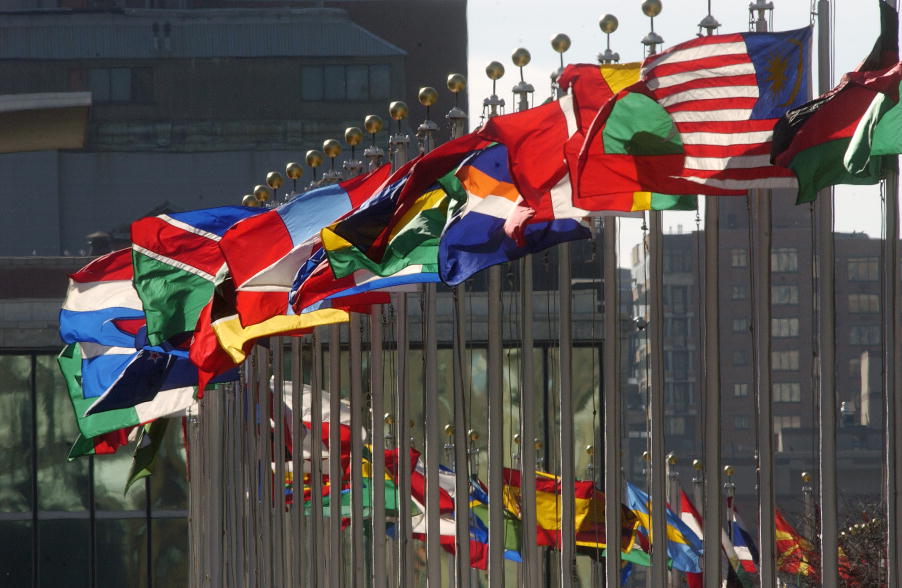The religious threat to global human rights must be taken seriously
Posted: Thu, 20th May 2021 by Keith Porteous Wood
UN efforts to challenge violations of human rights should consider both oppressive laws which theocrats uphold in former colonies and efforts to impose similar agendas further afield, says Keith Porteous Wood.
This article is available in audio format, as part of our Opinion Out Loud series.
The United Nations recently asked NGOs with whom it works about the legacies of colonialism that still had adverse implications for human rights. Some of the worst systemic human rights abuses codified in the law of around 70 states are those criminalising consensual sex between adults of the same sex.
About 40% of these are in Africa, which was almost entirely colonised by European empires. Such acts were also potentially subject to life imprisonment in India, introduced under British rule. Even after British rule, there is a possible death penalty in Pakistan and ten years' imprisonment in Bangladesh. In India criminalisation persisted until 2018.
These remnants of colonialism are implied by the title of this article in The Independent , which refers to "LGBT+ rights across the Commonwealth" and "Britain's colonial legacy of homophobia". The article also notes that "half of the 70 countries that criminalise homosexuality worldwide are (UK) Commonwealth members". Details of the position in individual countries are here.
There are strong correlations between former colonies and modern laws in contravention of human rights. But there is also a different cause for these widespread violations continuing.
The first thing to note is that there remain 11 countries where the death penalty is effective or possible, despite the UN passing a resolution condemning the use of the death penalty as punishment for consensual gay relations. Unbelievably this was opposed by the United States. All 11 countries are Muslim majority countries.
In 2019 Iran defended such laws: "Our society has moral principles. And we live according to these principles. These are moral principles concerning the behaviour of people in general. And that means that the law is respected and the law is obeyed."
A further clue comes in another passage from the Independent article, which warns of a "new wave of fundamentalist evangelicalism", funded from abroad. It adds that "well-funded evangelical groups from America have been spending vast amounts of money to build new movements and churches against LGBT+ equality in developing countries". Christianity is the most widely practised religion in most Commonwealth nations.
In an investigation published in 2020, openDemocracy noted that the US Christian right had poured more than $50m into Africa since 2007. One researcher based in South Africa said US conservative networks were "exporting hate to Africa and other parts of the world, along with US-style culture wars and polarisation over issues relating to gender and sexuality". The article also noted that in 2005, a plan for AIDS relief in Africa promoted by the George W Bush administration reserved two thirds of its HIV prevention funds for abstinence and fidelity campaigns, which were strongly supported by religious conservatives. The Bush plan spent about $1.4bn on such programmes.
And Africa is only part of this anti gay 'crusade': the article also noted that since 2008, US Christian right groups had spent more than $280m outside the US – across several continents.
There is also a great deal similar happening in Europe, some of the most concerning of which were set out in a leaked document – Restoring the Natural Order, an Agenda for Europe. The European Parliamentary Forum on Population and Development has described these plans in Restoring the Natural Order as the "clandestine workings and deliberate strategy of Europe's anti-choice movement, which is driven by religious dogma and often has the fingerprints of the Vatican". It paints a picture of a movement which would "force women to carry unwanted pregnancies, restrict access to contraception, decide who can marry and decide who can call themselves a family". Those behind this 'agenda' are attempting to push their personal beliefs on to others, and enshrine religious beliefs that violate human rights into law.
Another concern is Poland's Foundation Ordo Iuris Institute for Legal Culture, which EPF describes as "an extremist religious organisation". And in the most audacious and potentially far-reaching development Italy is now pushing for the Vatican to have a permanent role in UN health talks. This brings the threat of church doctrine being allowed to influence the decision-making body of the World Health Organisation, which would be detrimental to sexual and reproductive rights worldwide. Caroline Hickson, regional director of the International Planned Parenthood Federation, has warned that strengthening the Catholic Church's conservative influence in this "unique and vital arena for international collaboration on public health" could "spell disaster for women's reproductive health and rights".
Anyone who cares about upholding human rights should be concerned. Many decades after former colonies declared independence, laws which persecute gay people and severely restrict freedom of expression and women's rights continue to cause widespread misery. Meanwhile, rather than being in retreat, religious conservatives are seeking opportunities to push draconian restrictions across new parts of the globe.
And in both cases groups who wish to impose religious dogma on others are introducing or upholding serious violations of human rights and humanitarian law. In response to the UN's call for evidence, the National Secular Society has urged it to consider this.
Image: United Nations headquarters, UN Photo/Joao Araujo Pinto [CC BY-NC-ND 2.0]
While you're here
Our news and opinion content is an important part of our campaigns work. Many articles involve a lot of research by our campaigns team. If you value this output, please consider supporting us today.


